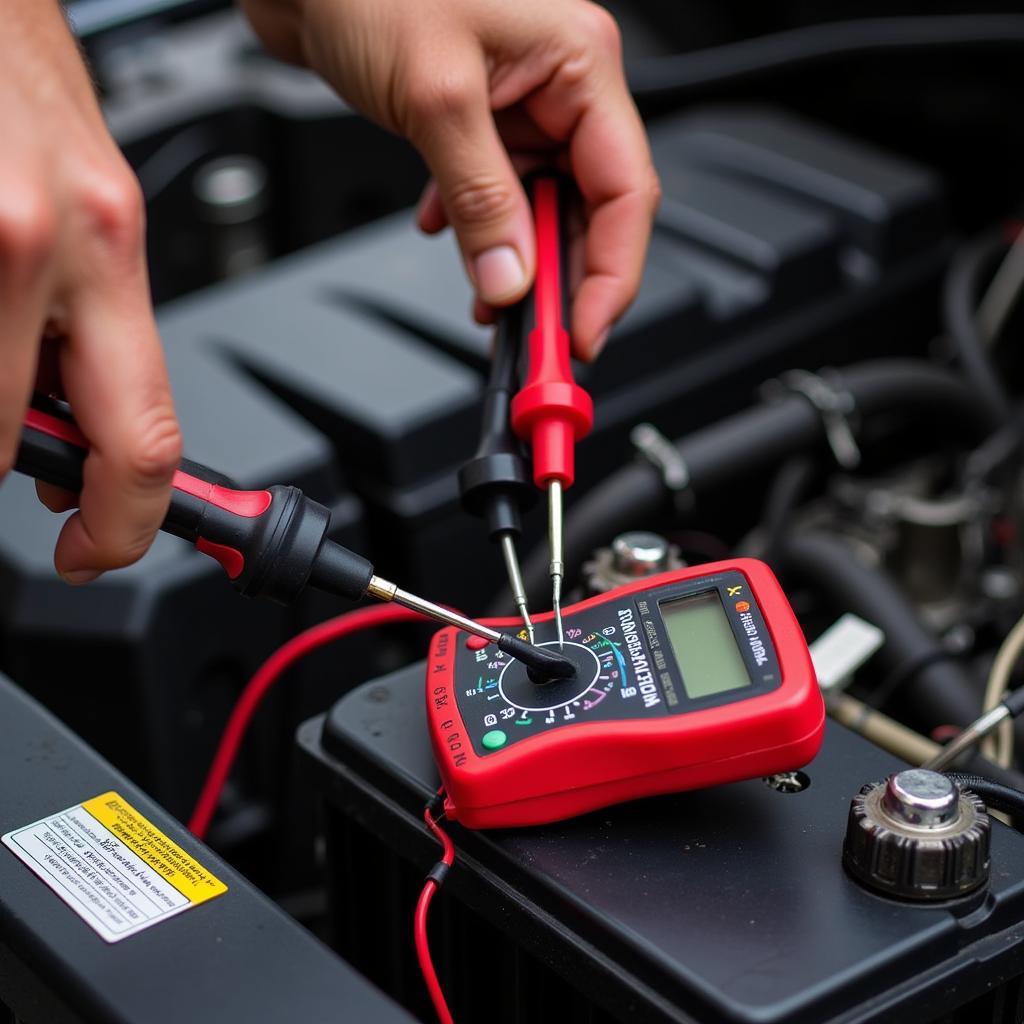Testing For Car Electrical Problems can be a daunting task, even for experienced mechanics. This guide provides a step-by-step approach to diagnosing and troubleshooting those pesky electrical gremlins that plague modern vehicles. From simple checks to more advanced techniques, we’ll cover everything you need to know to get your car’s electrical system back on track. Let’s dive in and empower you to tackle these issues head-on.
A vehicle’s electrical system is a complex network of circuits, sensors, and components that work together to power everything from the headlights to the engine control unit. When one part of this intricate system malfunctions, it can trigger a cascade of problems that can be difficult to diagnose. Understanding the basics of testing for car electrical problems is crucial for any car owner or mechanic. This knowledge can save you time, money, and frustration in the long run. car starter problems cost can be quite high, so being able to diagnose the problem yourself can save you a significant amount of money.
Understanding the Basics of Testing for Car Electrical Problems
Before diving into specific tests, it’s essential to understand the basic principles of electricity and how they apply to your car. A multimeter, a crucial tool for testing for car electrical problems, measures voltage, current, and resistance. Knowing how to use a multimeter effectively is the first step towards accurate diagnosis.
Essential Tools for Testing
- Multimeter: This versatile tool measures voltage, current, and resistance, allowing you to pinpoint electrical faults.
- Test Light: A simple but effective tool for checking the presence of power in a circuit.
- Jumper Wires: Useful for bypassing components or providing a temporary power source.
- Wiring Diagram: A roadmap of your car’s electrical system, essential for tracing circuits and identifying components.
 Testing Car Electrical System with Multimeter
Testing Car Electrical System with Multimeter
Knowing how to use these tools, combined with a solid understanding of your car’s electrical system, is paramount when testing for car electrical problems.
Common Car Electrical Problems and How to Test for Them
Several electrical problems can plague modern vehicles. Let’s explore some of the most common issues and how to test for them.
Battery Problems
A weak or dead battery is often the culprit behind starting problems. Testing your battery’s voltage with a multimeter is the first step. A fully charged battery should read around 12.6 volts. toyota car starter problems can sometimes be traced back to the battery, not the starter itself.
Starter Problems
If your car won’t start and the battery is good, the starter motor might be faulty. You can test the starter by checking for voltage at the starter solenoid when the ignition key is turned. whats the problem when car wont click can often indicate a starter problem.
“A common misconception is that every starting problem originates from a faulty starter. While the starter is often involved, a thorough diagnosis, including testing for car electrical problems throughout the starting circuit, is essential,” advises John Smith, Senior Automotive Electrical Engineer at Apex Automotive Solutions.
Alternator Problems
The alternator recharges the battery and powers the electrical system while the engine is running. A failing alternator can lead to a dead battery or dimming headlights. You can test the alternator by measuring the battery voltage with the engine running. It should be around 14 volts. car starter problem signs can sometimes overlap with alternator issues, so proper testing is crucial.
Wiring Issues
Loose or corroded wiring can cause a variety of electrical problems. Visually inspecting the wiring harness and checking for continuity with a multimeter can help identify these issues.
“Don’t underestimate the impact of seemingly minor wiring issues. A corroded connector or a loose ground wire can cause a host of electrical gremlins that can be frustrating to diagnose,” warns Jane Doe, Lead Electrical Systems Technician at Auto Electric Diagnostics. “A methodical approach to testing for car electrical problems is key to identifying these often-overlooked culprits.”
Conclusion: Mastering Car Electrical Diagnostics
Testing for car electrical problems requires a combination of knowledge, tools, and patience. By understanding the basics of electricity, using the right tools, and following a systematic approach, you can confidently diagnose and resolve many electrical issues in your vehicle. car problem clicking when trying to start can often be diagnosed using the techniques outlined in this guide. Remember, a well-maintained electrical system is vital for the safe and reliable operation of your car. For professional assistance with your car’s electrical system, contact AutoTipPro at +1 (641) 206-8880 or visit our office at 500 N St Mary’s St, San Antonio, TX 78205, United States.




Leave a Reply